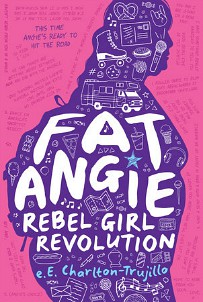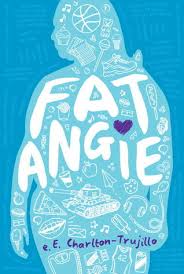When I finished Fat Angie, I felt a bit conflicted about it. I liked the character and thought the language use was interesting, but it was so dark that I felt like I couldn’t find even a glimmer of hope. Despite the many strong elements of the novel–who can resist queer girls kissing to the theme song of Buffy the Vampire Slayer?–I finished it feeling exhausted by the emotional weight of Angie’s life. It felt like there was no area of her life the was spared from cruelty.
So when I picked up the sequel, I was wary. I wanted more from Angie’s story, but I couldn’t handle another storyline that felt so unrelentingly hopeless. I didn’t need her to have a fairy tale ending, but I wanted there to be some element of hope in her story. Luckily, Rebel Girl Revolution delivered that. Angie begins the book much the same as she started the last one. Her next year in high school is not looking much better than her last. Her main tormentor has started dating her best friend, and Angie is not buying her sudden change of character. She is seeing a better therapist, thankfully, and her relationship with her brother is slightly improved, but her mother is still The Worst, and Angie is still lonely and deeply grieving. When she defends herself from a football player attacking her, things go from bad to worse. We do see some of the progress that Angie has made, though, because instead of channeling that into self-loathing, she spontaneously reaches out to an estranged childhood friend, Jamboree, and they go on the road trip that Angie’s sister wanted to take her on.
This was just wanted I wanted from Angie’s story. It’s still difficult, and she is still in a lot of pain. She’s also angry, and she’s questioning a lot about her life, including the relationships she has. Everything is tangled, complicated, and so raw–but it feels worth it. Angie hasn’t given up. She’s gone on trip this with Jamboree, Zeke, and (oops) Darius, and all of them have multilayered relationships with each other. They fight, they mess up, they threaten to abandon each other on the side of the highway, and they have dance parties together.
Some of my favourite things to read about are complex relationships, whether romantic, familial, or friendships. I love stories that can communicate the depth of conflicting emotions you have about a person: the kind of people in your life who you can be the most angry at, but who are your most treasured connections. How toxic relationships can feel, at times, as if they’re the best things in your life, and how that can be the most dangerous part. Or the relationships that can be so much work, but that are nourishing, sustaining. Rebel Girl Revolution wrestles with the complicated connections that every character has with each other, in a way that feels very real.
Not only does Angie develop more connections, she also pushes herself to grow in the ways that matter to her. This trip is partly following her sister’s lead, but it’s also a chance for her to take control of who she wants to be. She throws herself, sometimes with intense fear, into new situations. Sometimes she gets spat back out. But sometimes, she shines. It suggests that there is a future for her, and that there are more options available to her than she imagined.
This isn’t a Disney movie ending. It’s not Angie all better, popular, or becoming prom queen. But it’s her making progress. It’s Angie feeling as if, sometimes, she’s doing okay. If you’re looking for YA that doesn’t shrink away from despair, pick up Fat Angie, for sure. But even if that seems too much for you, I definitely think this is worth the read (and I feel like it could work as a standalone?) I hope to see more from Angie in the future.
Trigger warnings: cutting, suicide ideation, parental abuse, violence, bullying/harassment, grief, PTSD, war flashbacks


